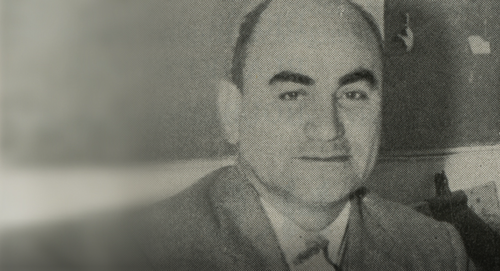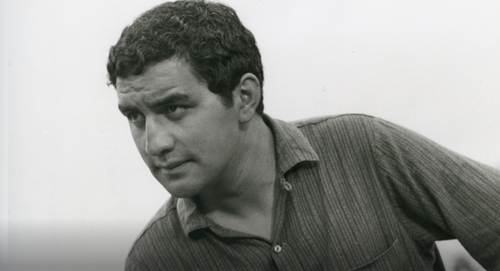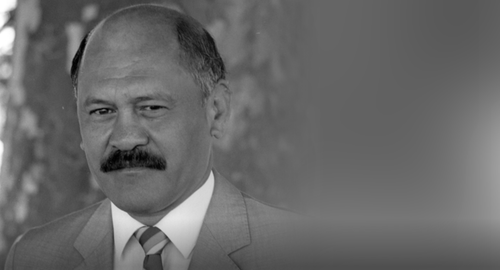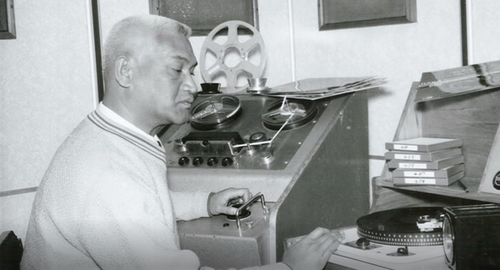
Edward (Ted) Henry Nēpia (1904-1983) - Ngāti Kahungunu (Image: Hastings Street School Souvenir Booklet, 1960 - Hawke’s Bay Museums Trust, Ruawharo Tā-ū-rangi, 24270)
Ted Nēpia Speaks with Rineti Reid
Ted, as he was known to most, was a passionate educationalist, working mainly in the lower North Island teaching much of the time in Māori schools in the Wellington, East Coast, Wairarapa, Waikato and Hawke’s Bay regions. He was head of the General Studies department at Wellington High School in the mid to late 1960’s. He remained active in his educational role, having developed the Correspondence School’s Māori language curriculum in 1972 after an involvement in Māori education for some 47 years as a teacher, principal, consultant advisor and senior Teachers’ College lecturer.
Here Nēpia speaks with Rineti Reid, a Māori speaking Pākehā teacher on the importance of teaching Te Reo Māori in schools.
This is an excerpt from the programme 'Te Reo o te Māori' , 20 September 1972.
Collection reference 44137
Year 1972
Ted Nēpia and Māori Language Day
In the late 1950s Ted began his broadcasting career part-time, as an announcer at the Napier station 2ZC, where he produced and presented a weekly programme Te Reo o Te Māori. This was very popular with te reo-speaking listeners all over the East Coast and in the 1960s, it became the first nationwide Māori language magazine programme when it was networked throughout the country by the New Zealand Broadcasting Corporation’s new Māori Programme section lead by Leo Fowler.
Ted’s programmes were in-depth examinations and explanations on a huge range of topics, highlighting his own deep of knowledge of the Māori subjects he discussed, and often interviewing noted kaumātua from throughout the country.
He later said he felt it was important to convince kaumātua and kuia to share tribal histories, to ensure this information was passed on to later generations. He would often spend many hours building a rapport with elderly ‘microphone-shy’ interviewees to gain their confidence before he could record them. His hope was that his recordings would form a valuable resource for Māori researchers of the future.
In this clip Ted Nēpia introduces a programme examining Māori Language Day in 1973
This is an excerpt from the programme 'Te Reo o te Māori' , 30 September 1973.
Collection reference 48883
Year 1973

Selwyn Muru (1937- ) - Ngāti Kurī, Ngāpuhi (Image: Pacific Film Production Limited)
Selwyn Muru and Whina Cooper on Football
Broadcaster Selwyn Muru interviews Whina Cooper, who at the time was President of the North Hokianga Rugby Union. The unedited conversation ranges over many topics and is a great example of Muru's rapport with his interview subjects.
This is an excerpt from the recording 'Whina Cooper - Interview' , 13 September 1974.
Collection reference 41565
Year 1974
Selwyn Muru and Whina Cooper - Te Rōpū Matakite
Broadcaster Selwyn Muru speaks with Whina Cooper about the 1975 land march from Te Hapua in the far North to Parliament. The conversation covers her concerns for Māōri land and the group of marchers, Te Rōpu o te Matakite.
This is an excerpt from the recording 'Te Reo o te Pipiwharauroa' , June 1975.
Collection reference 40605
Year 1975

Tānara Whairiri-ki-tawhiti Ngata (1942–2016) - Ngāti Porou (Image: Ngā Taonga Sound & Vision Collection)
Whai Ngata on Whakatauaki
Tānara Whairiri-ki-tawhiti Ngata is described as one of the key figures in the revitalisation of Te Reo Māori through his work in newspaper, radio, television and as a lexicographer.
Born in Waipiro Bay on the East Coast he was educated at Tapu Te Ariki School in the small community of Hiruharama south of Ruatōria. His childhood was informed by the constant presence of Mt Hikurangi and conversations of his father Hōri Māhue Ngata and other kaumātua. He attended several schools and universities including Māngere East Primary School, Otara Intermediate, Te Aute Māori Boy’s College Hawke’s Bay and St. Stepehen’s College in Ramarama. His tertiary scholarship included Auckland Teacher’s Training College as well as Auckland and Victoria Universities.
In 1968 Whai Ngata started as a journalist at The Auckland Star. He joined Radio New Zealand in 1975 and in 1983 he moved to Television New Zealand covering Māori stories for the nightly six o’clock news bulletin. Soon he joined Derek Fox putting the Māori news service Te Karere to air each night.
The bulletin created "a huge reaction“ from a non-Māori speaking audience being criticised as overly invasive, “They didn't want te reo Māori on television then. There were reports that people found it difficult to get a drink at pubs because everyone was watching it.” The news service continues to this day, expanding out to a half hour format.
Tānara Whairiri-ki tawhiti Ngata continued his tenure at Television New Zealand for over 25 years rising to the Head of Māori Programmes at TVNZ, overseeing the production of hundreds and hundreds of hours of Māori language programming.
In this excerpt from the radio programme Te Reo o te Pipiwharauroa, Ngata discusses different whakatauaki (Māori proverbial sayings) and introduces kōrero from veteran Māori broadcaster Wiremu Parker.
This is an excerpt from the recording 'Te Reo o te Pipiwharauroa' , 01 August 1976.
Collection reference 42160
Year 1976
Credits Speaker: Wiremu Parker
Whai Ngata reports on Bastion Point
In 1975 Ngata joined Radio New Zealand and reported on the massive political land march lead by Whina Cooper. He then embarked on a three-year tenure at Radio New Zealand’s Maori programme Te Puna Wai Kōrero. His approach to the programme covered a huge spectrum of Māori events, from ancient waiata, ngā mōteatea as well as activities of the Stormtrooper gangs in South Auckland.
His coverage of the occupation at Takaparawhau, Bastion Point solidified his gravitas and confidence with Māori.
“We visited Takaparawhau and it was only by a leaked snippet of information that we were ready when some 800 police and army personnel marched into New Zealand history, as the biggest 'overkill' that I had witnessed in some 40 years in the media. It was a terrible sight, seeing kaumātua being marched and carried off their own whenua”, he recalled.
In this news report from Te Puna Wai Kōrero on 25 May 1978, Whai Ngata reports on Ngāti Whātua and their forced eviction from Takaparawhau/Bastion Point.
This is an excerpt from the programme 'Te Puna Wai Kōrero - Ngāti Whatua and Bastion Point' , 25 May 1978.
Collection reference 40403
Year 1978

Wiremu (Bill) Kerekere (1923-2001) - Te Aitanga-a-Māhaki (Image: Archives New Zealand - Communicate New Zealand Collection: R24460988)
Wiremu Kerekere: Waiata Māori
Wiremu (Bill) Kerekere was always proud to identify with the East Coast settlement of Waihīrere south of Gisborne where he spent his formative years. He was a gifted musician and songwriter and he was a leader of the famous Waihīrere Māori Club.
At age 12 years he was a drawcard at many dancehall performances where people would flock in anticipation of witnessing his unique piano playing style. Kerekere went on to play the cabaret circuit and he had a love of jazz music, with an admiration for great vocalists like Ella Fitzgerald, Sarah Vaughan and in particular Nat King Cole, all the while composing his own music.
In 1964 Kerekere started working at the newly-established New Zealand Broadcasting Corporation’s Māori Programmes section with Leo Fowler. They were a common sight at many Māori hui of significance throughout the country with their microphones and other equipment, recording mihi, waiata and proceedings which would then be packaged and put to air.
He continued working as a consultant for radio in Wellington, even after the main Māori broadcasting unit moved to Auckland in the late 1970s. Bill was recognised as a Māori cultural representative and he accompanied Māori concert parties on significant overseas trips such as the ground-breaking visit to China in 1980, with Reverend Kīngi Ihaka and Kara Puketapu.
In this excerpt from the radio programme Te Reo o te Pipiwharauroa, Kerekere shares examples of waiata Māori composed for youth and performing groups by Rev. Kīngi Ihaka and others.
Collection reference 42183
Year 1977